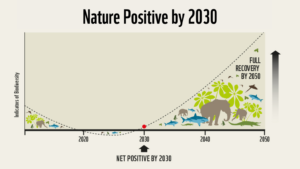A nature positive business approach puts nature and the environment at the center of business decision-making. This approach is important for addressing climate change, conserving biodiversity, and advancing sustainable development. Some of the largest landholders around are businesses, schools, and churches whose properties offer a tremendous opportunity to impact water quality and wildlife in the region. The Conservation Foundation, through its Conservation@Work program, educates business owners and organizational leaders on the benefits of native plants, ways to conserve the rainwater that falls on their land, proper management of invasive species, and how to reduce chemical use and watering – and therefore truly take a nature positive approach.
What is Nature Positive?
“Nature positive” is a term used to describe a world where nature is being restored and is regenerating rather than declining. It involves halting and reversing current trends of ecological destruction. The goal is to have healthier nature in the world in the next decade than there is today.
Recognizing this, world leaders agreed in December 2022 to the Global Biodiversity Framework (GBF), which sets an overarching goal to reverse biodiversity loss by 2030 by encouraging organizations to take a nature positive approach. A nature positive approach enriches biodiversity, stores carbon, purifies water, and reduces pandemic risk. In short, a nature positive approach enhances the resilience of our planet and our societies.

Image from Nature Positive Initiative
And it makes business sense. The Future of Nature and Business report’s estimates that a nature positive approach can unlock $10 trillion of business opportunities by transforming the food, infrastructure, and energy economic systems that are responsible for almost 80% of nature loss.
What Actions Can Be Taken?
A nature-positive business approach puts nature at the center of business decision-making. This approach is important for addressing climate change, conserving biodiversity, and advancing sustainable development.
A nature-positive business approach includes:
- Eliminating practices that destroy land and water environments
- Taking advantage of Nature-based Solutions
- Actively improving the state of nature itself
- Designing and offering more nature-friendly products and services
- Improving resource efficiency
An important step is the protection of 30% of the land and ocean by 2030. The G7 committed to this goal, paving the way for an international agreement later this year in Kunming, China, when nations will meet to agree on goals to protect biodiversity as part of the United Nations Convention on Biological Diversity.
Among other things, the GBF also pledges to close the conservation funding gap and mobilize at least $200 billion of financing per year by 2030. Until now, 80% of the funding going to nature conservation comes from public sources. To reach the targets set out in the GBF, it will be necessary to add funding from the private sector and market-based instruments.
One potential tool mentioned is voluntary biodiversity credits (VBC), which aim to assign an economic value to efforts to preserve or restore ecosystems.
Investing in VBCs could be one way for companies to improve the reputation of their brands and products as well as attract talent, retain customers, and reduce the risk of regulatory exposure. Several countries, including Australia, the UK, and Gabon, are already embracing credits, and moving to legislate. The UK and France are leading a global roadmap to deliver an international biodiversity credit market agreed at the New Global Financing Pact held in Paris in June 2023.
How TCF Helps (Conservation@Work)
As previously stated, some of the largest landholders around are businesses, schools, and churches whose properties offer a tremendous opportunity to impact water quality and wildlife in the region. Through The Conservation Foundation’s Conservation@Work program, we educate business owners and organizational leaders on the benefits of native plants, ways to conserve the rainwater that falls on their land, proper management of invasive species, and how to reduce chemical use and watering. The Conservation Foundation helps organizations to protect land and water and, therefore, be nature positive.

These practices not only help preserve and restore our natural environment, but they can drastically reduce maintenance costs while providing shelter for beneficial wildlife and beautiful outdoor spaces to enhance employee and customer satisfaction. In other words, being nature positive is not only good for the planet, but is also good for business.
Those who employ these principles can earn Conservation@Work certification, and receive a sign recognizing their efforts and one-on-one advice about ways to make an even more positive environmental impact on their property. There is a one-time fee of $300 for certification, which includes a one-year membership to The Conservation Foundation.
Ready to fight for conservation and a Nature Positive future? Well, that is what The Conservation Foundation does every day. We can all do more together than we can alone. Join our collective momentum – become a member today!
Contact us if you’d like to learn more about our Conservation@Work program. It’s easy to get started.
Feel free to comment on this blog with your ideas on being Nature Positive.
By Steve Stawarz, Oak Brook
DuPage County Advisory Council Member



